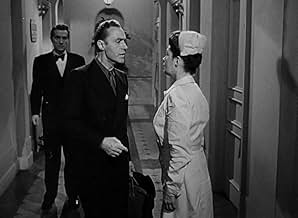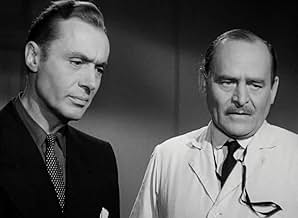AVALIAÇÃO DA IMDb
6,3/10
2,1 mil
SUA AVALIAÇÃO
Adicionar um enredo no seu idiomaIllegal refugees lead dark lives in pre-World War II Paris.Illegal refugees lead dark lives in pre-World War II Paris.Illegal refugees lead dark lives in pre-World War II Paris.
- Direção
- Roteiristas
- Artistas
- Prêmios
- 3 vitórias no total
Richard Alexander
- Gestapo Agent
- (não creditado)
Sylvia Andrew
- Milan Charwoman
- (não creditado)
Frank Arnold
- Newsboy
- (não creditado)
Jessie Arnold
- Cashier
- (não creditado)
George Balooi
- Scheherazade's Waiter
- (não creditado)
Avaliações em destaque
Lewis Milestone scored his greatest film success when he did the classic adaption of Erich Maria Remarque's novel All Quiet on the Western Front in 1931. It seemed a natural for him to do an adaption of another Remarque book, Flotsam, retitled here as Arch of Triumph. I guess that United Artists didn't want the audience to think the film was about sea refuse.
Unfortunately while All Quiet on the Western Front stayed very much on its anti-war message, Milestone opted to make one of those tragic romances that Frank Borzage was more noted for. The problem of all the refugees from all the political turmoil up to THAT time collecting in places like Paris was left very much in the background.
Charles Boyer is one of those refugees, a Czech who can't go back to his own country because of Hitler's bloodless takeover. He's a doctor who's been serving in Loyalist Spain and got run out of there. With no passport, he's an illegal alien in France in 1939 and subject to deportation which he is by the way at one point in the film.
He meets Ingrid Bergman who's also a refugee of sorts from a series of bad relationships. He saves her from suicide and a relationship develops. In fact when Boyer is deported, she does what she has to do to survive.
Louis Calhern may have the best role in the film as Boyer's friend and counselor, an exiled Russian Lieutenant Colonel of the Czar's guard who is a doorman at a swank Russian café. Charles Laughton is in here to as an S.S. officer who Boyer remembers killing his old girl friend back in Spain and who he hunts without mercy. Laughton has one of the smallest roles he ever did in a film and I wish there were more of him here.
Laughton is seen briefly at the beginning doing the torture in his best Inspector Javert manner. Later on when Boyer spots him and makes his acquaintance to lure him for the kill, he's an avuncular tourist, but clearly on some kind of mission. He's good in both sides of the same character.
It's a real downer of a film, Arch of Triumph. Good thing we know how history turned out because it sure doesn't look good for the good guys when this film ends.
Unfortunately while All Quiet on the Western Front stayed very much on its anti-war message, Milestone opted to make one of those tragic romances that Frank Borzage was more noted for. The problem of all the refugees from all the political turmoil up to THAT time collecting in places like Paris was left very much in the background.
Charles Boyer is one of those refugees, a Czech who can't go back to his own country because of Hitler's bloodless takeover. He's a doctor who's been serving in Loyalist Spain and got run out of there. With no passport, he's an illegal alien in France in 1939 and subject to deportation which he is by the way at one point in the film.
He meets Ingrid Bergman who's also a refugee of sorts from a series of bad relationships. He saves her from suicide and a relationship develops. In fact when Boyer is deported, she does what she has to do to survive.
Louis Calhern may have the best role in the film as Boyer's friend and counselor, an exiled Russian Lieutenant Colonel of the Czar's guard who is a doorman at a swank Russian café. Charles Laughton is in here to as an S.S. officer who Boyer remembers killing his old girl friend back in Spain and who he hunts without mercy. Laughton has one of the smallest roles he ever did in a film and I wish there were more of him here.
Laughton is seen briefly at the beginning doing the torture in his best Inspector Javert manner. Later on when Boyer spots him and makes his acquaintance to lure him for the kill, he's an avuncular tourist, but clearly on some kind of mission. He's good in both sides of the same character.
It's a real downer of a film, Arch of Triumph. Good thing we know how history turned out because it sure doesn't look good for the good guys when this film ends.
Pay no attention to high-brow detractors; if you want to see a luminous Ingrid Bergman and a world-weary Charles Boyer at their film noir best, run--do not walk--to your nearest store and buy this film (VHS only, unfortunately).
Do not expect sparks to fly between these war-time lovers--Bergman as a kept woman carried along willy-nilly by forces beyond her control, and Boyer as a physician and resistance member on the run in occupied Paris--their encounters are brief and ill-starred, save only for the deep tenderness that occasionally surfaces, especially at the film's end.
Casablanca it's not, but it will disappoint no lover of this genre.
Do not expect sparks to fly between these war-time lovers--Bergman as a kept woman carried along willy-nilly by forces beyond her control, and Boyer as a physician and resistance member on the run in occupied Paris--their encounters are brief and ill-starred, save only for the deep tenderness that occasionally surfaces, especially at the film's end.
Casablanca it's not, but it will disappoint no lover of this genre.
This could have been a much better movie. Boyer's disenchanted, vengeful refugee doctor is excellent and Bergman's Joan, unable to commit or disengage, could have been a fascinating characterisation. But while individual scenes are very fine, the film, as a whole, is oddly disconnected, suggesting ruthless cutting. The sub-plot involving Laughton's porcine Gestapo bully is perfunctory and we get far too much of Calhern's emigre. Still, the black and white photography is impressive, and I rather went for the doom and gloom!
Director Lewis Milestone tries - and succeeds, to some extent - to make ARCH OF TRIUMPH an interesting film. To that end, he is greatly helped by the cinematography, with beautiful chiaroscuros that heighten the oppressive atmosphere, but he is let down by a meandering script, a far cry from Remarque's original novel.
Boyer, normally a middle of the road actor, does well enough here to overshadow even the great Ingrid Bergman (they had been paired together in GASLIGHT, 1944, and she had won an Oscar for that performance). I think that happened because by this point Bergman had already met, and fallen in love with, Roberto Rosselini, and that must have distracted her no end (her character even claims to be Italian, and she speaks Italian toward the end of the film). That emotional upheaval, which was about to have serious consequences for her career, pushing her out of Hollywood for about 8 years, definitely impacted on her acting in this film, and on the latter's quality.
In the end, it is the film's dark atmosphere that stays with you - and that's not much. Still, I am glad I watched it, it is better than many supposedly politically correct movies done today.
Boyer, normally a middle of the road actor, does well enough here to overshadow even the great Ingrid Bergman (they had been paired together in GASLIGHT, 1944, and she had won an Oscar for that performance). I think that happened because by this point Bergman had already met, and fallen in love with, Roberto Rosselini, and that must have distracted her no end (her character even claims to be Italian, and she speaks Italian toward the end of the film). That emotional upheaval, which was about to have serious consequences for her career, pushing her out of Hollywood for about 8 years, definitely impacted on her acting in this film, and on the latter's quality.
In the end, it is the film's dark atmosphere that stays with you - and that's not much. Still, I am glad I watched it, it is better than many supposedly politically correct movies done today.
This is certainly not Ingrid Bergman's best movie, though her performance as Joan, and Boyer's as Ravic, are terrific. But you will never see a more beautiful Ingrid than in the magnificent black and white =chiaroscuro= of Russell Metty's photography, and Ingrid is very touching as the "lost woman" hinted at but never fully realized in "Casablanca" and "Notorious." Even considering that Bergman was gorgeous on screen for almost forty years, her stunning image in this somewhat confused thriller-soap opera, is worth the price of admission; plus the dialogue is pretty good, and you get to see Charles Laughton as an evil Nazi colonel!
Você sabia?
- CuriosidadesThe rough cut of the film ran four hours. In reducing it to two hours, several actors were cut, including Ruth Warrick. She does appear briefly in the restored 133-minute version.
- Erros de gravaçãoWhen Ravic takes his gun and goes to look for Haake in the streets, the first shot of him has been reversed for some reason as evidenced by the signs he passes, which are backwards.
- Citações
Joan Madou: He wanted to kill me. They always talk about it but they never do.
[laughs]
Joan Madou: You wouldn't want to kill me.
- ConexõesFeatured in Legendy mirovogo kino: Charles Boyer
- Trilhas sonorasLong After Tonight
(1948) (uncredited)
Music by Rudolph Polk
Music by adapted from the Russian folk song "Prochlada"
Lyrics by Ervin Drake and Jimmy Shirl
Sung by an uncredited singer dubbing Ingrid Bergman at the Scheherazade casino
Principais escolhas
Faça login para avaliar e ver a lista de recomendações personalizadas
- How long is Arch of Triumph?Fornecido pela Alexa
Detalhes
- Data de lançamento
- País de origem
- Idiomas
- Também conhecido como
- O Arco do Triunfo
- Locações de filme
- Empresas de produção
- Consulte mais créditos da empresa na IMDbPro
Bilheteria
- Orçamento
- US$ 5.000.000 (estimativa)
- Tempo de duração
- 2 h(120 min)
- Cor
- Proporção
- 1.37 : 1
Contribua para esta página
Sugerir uma alteração ou adicionar conteúdo ausente


































